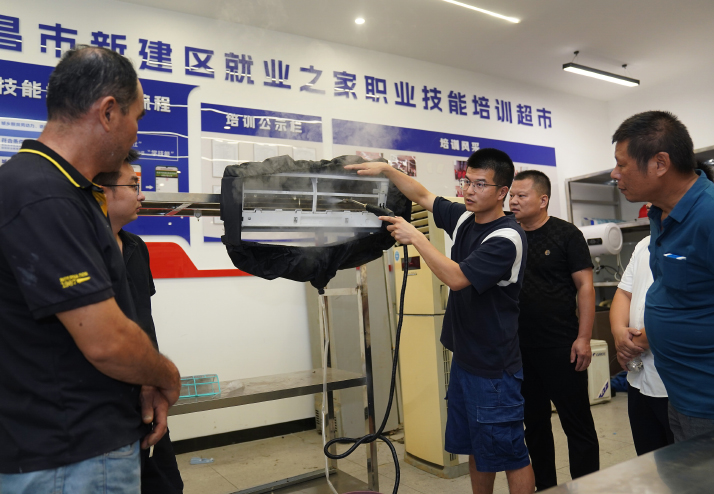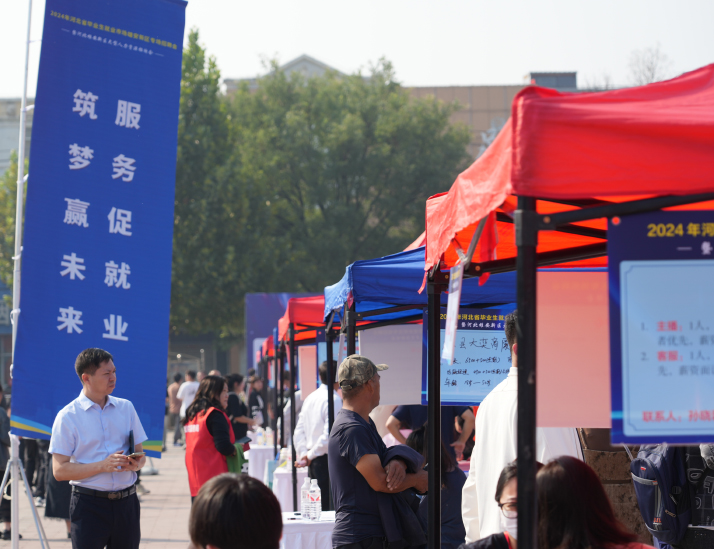| China |
| Unemployed middle-aged people strive to get back on track | |
|
|
 Unemployed workers receive free training at a community employment center in Nanchang, Jiangxi Province, on September 13 Recruiters and job seekers come together at a job fair in Xiong'an New Area in Hebei Province on September 25 (XINHUA)
The struggle of unemployed middle-aged people to support their families has been brought to the fore on social media by the finale of television series Born to Be One in late September. Led by Yin Tao, who won Best Actress at the 2017 Shanghai TV Festival Magnolia Awards, the series explores the decisions people make when faced with life challenges such as unemployment, difficulties in relationships and betrayal by friends. The series tells the story of Shen Lin, a housewife and mother of two in her early 40s, who had quit her job years prior to take care of her family but was forced to return to job hunting after her husband Na Wei, a well-paid senior marketing manager, was laid off. Following Na's unexpected unemployment, the couple made a series of adjustments to keep their family on track, including starting a private studio, expanding their job hunting to include new fields, dismissing their babysitter, turning to relatives for help, decreasing their spending on necessities, and moving from the city center to the suburbs. Throughout the series, Born to Be One received the highest ratings in its timeslot and was rated 7.4 out of 10 on China's media review platform Douban. Many viewers acclaimed the story as being "true, vivid and genuine," and described the characters as "tough, brave and resilient." Wang Huili, 39, can relate to the show's plot. As a housewife with a recently unemployed husband, Wang said that one of the reasons the series became a hit is that it zooms in on the real-life difficulties facing many middle-aged people and how they rise above tough times. "I am relieved to know the characters managed to work out their financial problems in the end. It gets your hopes up," Wang told Beijing Review.  Recruiters and job seekers come together at a job fair in Xiong’an New Area in Hebei Province, on September 25 (XINHUA)
Forging ahead Wang's husband Zhou, formerly a senior algorithm engineer at an Internet company in Beijing, was laid off in late 2023. Since then, Wang has been selling handmade pastries and dishes in her neighborhood, and her husband has spent half of his time working as a ride-hailing driver and the other half hunting for new jobs with Internet companies. Both of them are working longer hours than before, but they are making less money and have been going out of their way to cut back on their spending. "I used to devote all of my time to housekeeping and taking care of my children, but now I have to work at least six hours a day, so we often ask my mother-in-law to stay over and help with the kids," Wang said. While some single young people may take gap years to rest, travel, volunteer and develop themselves after losing their jobs, those in middle age, who need to provide for their families, usually can't afford to do so. "We can't afford to stop," Wang said. "Even though we have some savings, we don't know whether we will be able to find another stable position in the near future, so we have to keep working." Wang and Zhou now fall under the official category of flexible workers according to the definition of the Ministry of Human Resources and Social Security, which refers to those without stable long-term employment contracts, who run individual businesses or take short-term orders. By the end of 2021, China had over 200 million flexible workers, accounting for about 14.3 percent of the total population. According to a report on flexible workers co-published by Jinan University and JunRun Human Resources Service Co. Ltd. in 2022, almost 52 percent of the flexible workers surveyed were aged over 31, and over 30 percent were married. China first included flexible workers in the Government Work Report in 2016, and the related policies put in place so far include increasing their social security subsidies, improving work-related injury insurance, and loosening the household registration restrictions on their social insurance. "With the surge of fresh graduates and the recent emergence of new professions, an increasing number of people are on their way to becoming flexible workers," Lai Yang, a member of the China General Chamber of Commerce, told news portal Finance.China.com. "And many flexible services, including house calls for pet care, providing meals, housekeeping and caring for seniors, as well as some short-term positions offered by livestreaming studios, are often not provided by companies or bound by long-term contracts, but are rather offered through third-party platforms and intermediaries. Governments should implement policies to supervise these platforms to protect workers' interests." Looking forward Zhou, Wang's husband, said that one of the major causes of his redundancy and his difficulty in finding a new job is his age. "I'm 36 now, which is too old for many Internet companies, because they believe that people my age are not as sharp and smart when it comes to learning as younger people. I came to this conclusion based on dozens of interview experiences," Zhou told Beijing Review. "But I can say for sure that I'm much more mature, calm and prudent than I was 10 years ago, not to mention the tons of experience I've gained over the years." Zhou is not alone in suffering from "ageism." According to a 2022 report from the All-China Federation of Trade Unions, 98.1 percent of workers aged 35 to 39 surveyed nationwide are feeling constant pressure from the workplace because of their age, and 54.1 percent of these workers suffer from anxiety about losing their jobs in the future. Similarly, London-based insurance company Hiscox reported in 2022 that more than 21 percent of workers over 40 in the United Kingdom had suffered from different levels of age discrimination. To ease controls on the age of jobseekers and make more jobs available to middle-aged workers, many government departments at provincial levels have raised the age limits on the entrance exam for public servants. Henan Province, for example, announced that candidates under 40 can take the provincial exam, extending the original age limit from 35. Other provincial-level regions, including Guangxi, Anhui and Chongqing, have removed the age limits for some positions. These moves are seen as signals of opposition to ageism and as examples for enterprises to follow. "The government's endeavors to remove the age limits for some public service positions will set an example for companies. The government should additionally step up efforts to supervise and punish companies that have been accused of discriminating against middle-aged workers," Li Zhengguo, a member of the National Committee of the Chinese People's Political Consultative Conference, told newspaper National Business Daily. (Print edition title: Derailed But Not Defeated) Copyedited by G.P. Wilson Comments to zhangyage@cicgamericas.com |
|
||||||||||||||||||||||||||||||
|